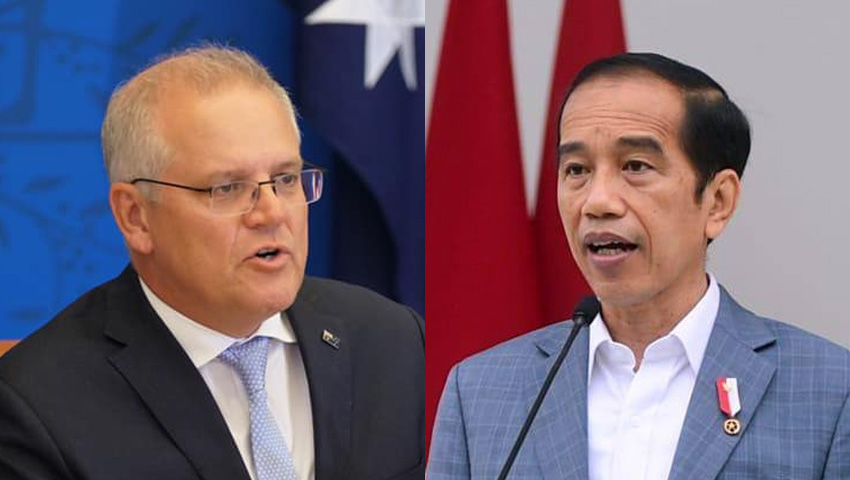Australia should invest more capital in building ties with Indonesia if it hopes to realise the potential of the strategic relationship, one analyst observes.
To continue reading the rest of this article, please log in.
Create free account to get unlimited news articles and more!
David Engel, head of the Australian Strategic Policy Institute’s (ASPI) Indonesia program, proposes ways in which Australia can strengthen ties with Indonesia, which he claims have been exaggerated in recent diplomatic exchanges.
Engel references Prime Minister Scott Morrison’s recent claim that the relationship is built on “trust that underpins only the truest of friendships”, and Indonesian President Joko Widodo’s labelling of Australia as Indonesia’s ‘truest friend’.
“Such hyperbole might have been necessary given the occasion, but it’s a chimerical basis for building the kind of strategic partnership from which both countries would benefit over coming decades,” Engel writes.
“We should inch our reality closer to the rhetoric by enhancing our practical ties with Indonesia in a few areas.”
The ASPI analyst acknowledges the Morrison government’s recent efforts to mend ties with the northern neighbour, last strained by the once touted relocation of Australia’s embassy in Israel to Jerusalem, and by President Widodo’s renewed support for capital punishment.
Measures to rebuild Canberra’s relationship with Jakarta have included Australia’s response to Indonesia’s call for aid at the height of the COVID-19 pandemic, and its rhetoric around the benefits of the Indonesia–Australia Closer Economic Partnership Agreement and the Regional Comprehensive Economic Partnership.
But Engel claims it would be “naïve” to believe these moves can reshape entrenched perceptions of Australia among Indonesian policy makers.
“Many Indonesian leaders will remain suspicious of our motives and dismissive of our capacity to be a significant economic and strategic [partner],” he continues.
“We could multiply our leaders’ and ministers’ contacts, but whatever gains that might bring would quickly dissipate with the onset of the next bilateral spat, which is only ever just around the corner.
“Moreover, it invariably takes more time and effort to rebuild what’s broken than it did to break it; it’s a Sisyphean task.”
However, Engel stresses that Canberra should not be deterred by these diplomatic hurdles, calling on Australia to “push the relationship up a less frustrating incline”.
“It simply means that, no less than for Washington, we shouldn’t expect any lingering gratitude and reciprocity from Jakarta, least of all that our actions can buy us influence over its decision-making,” he adds.
“We should do it anyway, in part because not to do so would reduce the ballast that the relationship needs to survive rockier times.”
Engel urges Canberra to invest more capital in its relationship with Jakarta, outlining a number of ways in which Australia can break through diplomatic obstacles.
Despite acknowledging the Indonesian military’s (the TNI) occasional “hostility” towards Australia, the ASPI analyst proposes a ramp up in defence collaboration.
“Decades of activities between our armed forces haven’t doused such sentiment, so we shouldn’t expect that merely expanding joint training will change the TNI’s institutional mindset,” Engel writes.
“But it would improve the odds of disabusing Indonesia’s emerging military leaders of the fallacies about Australia’s capabilities and intent to which they’re often subjected and of building personal bonds between both officer corps that, in times of crisis, can help keep matters in a broader strategic perspective.
“We should be especially open to activities that Indonesia would welcome or, ideally, initiate in the maritime domain.”
Engel goes on to recommend an increase in foreign aid to Indonesia, conceding that while it may not garner gratitude or influence, it could improve public attitudes towards Australia.
“Ideally, we should restore aid flows closer to where they used to be by means of a ‘Southeast Asia step-up’ beyond what the government has announced. Failing that, the only way to mitigate this risk is to concentrate on those areas most likely to resonate with Widodo and the wider Indonesian public,” he writes.
“We should prioritise aid that meets what Indonesia identifies as its primary development needs rather than programs aimed at longer-term social objectives. That’s likely to mean refocusing the program to cleave more closely to Widodo’s own second-term development goals as enunciated in his inauguration speech, especially his aim to endow his country with a human resource base more skilled in sciences and technology.
“This would offer both practical support and a potential soft-power dividend.”
Finally, Engel proposes incentivising more young Indonesians to study in Australia, particularly in civil engineering and the STEM disciplines (science, technology, engineering and mathematics).
“This is a multidimensional problem demanding measures that in many cases lie beyond any Australian government’s reach. That said, the government could do far worse with its aid funds than expand the Australia Awards program significantly and should review how closely its current priority fields of study marry with Jokowi’s,” the analyst adds.
Again, Engel acknowledges that such incentives would not guarantee “even a balanced appreciation of Australia’s flaws and virtues”, but may succeed in fostering appreciation of Australian values among award recipients, some of which have ascended to senior levels of government and business.
“More to the point, reducing the number of awards — or even simply maintaining the same number while competitors like Beijing increase theirs — will guarantee that Australia’s chances of influencing Indonesian decision-makers will diminish commensurately and relatively to others’ at precisely the time when our interests will lie in improving our odds,” he warns.
But Engel states that the government should limit the number of awards granted to Indonesian government officials, claiming that Australia could benefit more from raising the proportion of both long- and short-term awards to non-government applicants, since Indonesia’s young entrepreneurial class “appears on course to influence and even define the country’s political economy”.
Engel concludes by noting that such proposals offer a “far from perfect answer”, acknowledging they may have implications that “run counter to Australian values”, but notes that until Australia has the “means to do more with more”, they may be “the least imperfect option from a national interest perspective”.
Get involved with the discussion and let us know your thoughts on Australia's future role and position in the Indo-Pacific region and what you would like to see from Australia's political leaders in terms of partisan and bipartisan agenda setting in the comments section below, or get in touch with
Charbel Kadib
News Editor – Defence and Security, Momentum Media
Prior to joining the defence and aerospace team in 2020, Charbel was news editor of The Adviser and Mortgage Business, where he covered developments in the banking and financial services sector for three years. Charbel has a keen interest in geopolitics and international relations, graduating from the University of Notre Dame with a double major in politics and journalism. Charbel has also completed internships with The Australian Department of Communications and the Arts and public relations agency Fifty Acres.

 Login
Login








